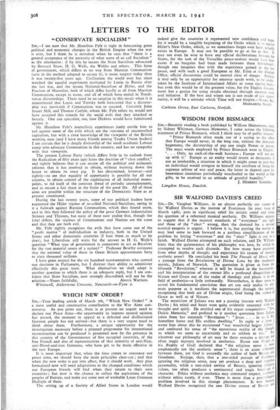LETTERS TO THE EDITOR
CONSERVATE SOCIALISM"
ant sure that Mr. Hamilton Fyfe is right in forecasting great political and economic changes in the British Empire when the war is over, but 1 think he is mistaken when he says that " there is a general acceptance of the necessity of what some of us call Socialism " as the alternative: if by this he means the State Socialism advocated by Bernard Shaw, H. G. Wells, the Webbs and others. This form of government, which differs in no way from Marxian Communism (save in the method adopted to secure it), is more suspect today than it was twenty-five years ago. Civilisation the world over has since watched the squalid experiment instituted by Lenin in Russia after the last war, and the insane National-Socialism of Hitler, and the Fascism of Mussolini, both of which differ hardly at all from Marxian Communism, except in name, and all of which have ended in Totali- tarian dictatorships. There need be no surprise in this result when it is remembered that Lenin and Trotsky both forecasted that a dictator- ship was inevitable if Communism was to succeed. Certainly John Stuart Mill, and Thomas Carlyle, whom Mr. Fyfe refers to, would not have accepted this remedy for the social evils that they attacked so fiercely. One can speculate, too, how Dickens would have fulminated against it.
Mr. Hamilton Fyfe's journalistic experiences justly entitle him to rail against some of the evils which are the outcome of uncontrolled capitalism, but with a close knowledge of the viewpoint of the British working man (and I have many friends among Trades Union leaders) I am certain that he is deeply distrustful of the small academic Labour rump who advocate Communism in this country, and has no sympathy with that viewpoint.
The present Labour Party (which differs little in its outlook from the Radicalism of fifty years ago) hates the doctrine of " class conflict," and rightly believes that it can secure all the political and economic reforms that it has resolved to obtain, without burning down the house to obtain its roast pig. It has determined, however—and rightly—to see that equality of opportunity is possible for all our citizens, to obtain control of the exploitation of all industrial mono- polies, to rid itself of the constant dread of periodic unemployment, and to secure a fair share in the fruits of the good life. All of these aims are possible within the structure of the Democratic State as at present constituted.
During the last twenty years, some of our political leaders have supported the Hitler regime of so-called National-Socialism, seeing in it a bulwark against Russian Communism, which they feared more, and in this they followed the policy of the great German industrialists Stinnes and Thyssen, but most of these now realise that, though the label differs, the regimes of Communism and Nazism are the same and that they are both evil.
Mr. Fyfe rightly recognises the evils that have come out of the " profit motive " of individualism in industry, both in the United States and other democratic countries (I hate them as much as he does), but Liberalism still waits for the answer to H. G. Wells's question " What type of government is competent to act as Receiver for the vast material assets of a nation? " Professor Bowlby estimates that the national value of these in Great Britain approximates forty to sixty thousand millions.
I have great respect for the six hundred representatives who control our destinies in Parliament, but I distrust their ability to administer effectively this great trust. What alternatives we shall adopt is another question to which there is an adequate reply, but I am con- fident that State Socialism, now strongly discredited, will not be the






































 Previous page
Previous page